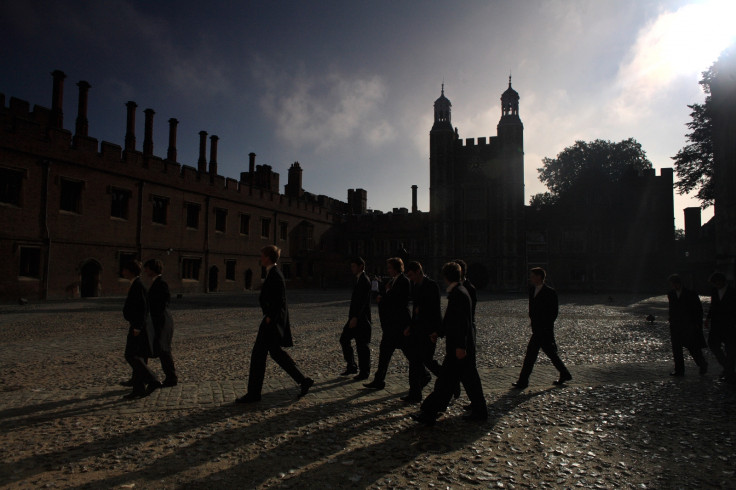A lack of working class MPs opens the door to nasty populism
The fact that politics is, in class terms, increasingly unrepresentative of the wider public is worrying.

With a media chorus seemingly intent on portraying new Prime Minister Theresa May as dependable, unflappable and, perhaps most of all, unexceptional, it is easy to forget just how unusual our previous PM was, at least in terms of his class background.
After leaving Oxford, former Etonian David Cameron got his first job at the Conservative Research Department because Lord Lexden, who at the time worked there as deputy director, received a telephone call from Buckingham Palace singing the praises of an 'outstanding young man'. Cameron worked there for six years. After a brief interregnum working for Carlton Communications, he became an MP in 2001 and, nine years later, the Prime Minister.
Yet the crude level of some of the jibes directed at Cameron during his time in office failed to move the debate around privilege forward. The barbs tended to dwell on Cameron the man and the hair-raising antics of the Bullingdon Club in particular, rather than the structural inequalities which lead to cabinets being helmed by old Etonians and dominated by millionaires in the first place.
One hopes, then, that the rise to power of a politician who is a little more middle class and, dare I say it, 'ordinary', may, paradoxically, allow a greater focus on the dominance of politics by a privileged elite. The fact that the former PM was 'posh' does not, after all, mean a great deal in isolation. However the fact that politics is, in class terms, increasingly unrepresentative of the wider public ought to be a genuine cause for concern.
This applies to Labour just as much as it does to the Conservatives. When Margaret Thatcher came to power in 1979, around 40 per cent of Labour MPs had done some form of manual or clerical work before entering Parliament. By 2010 that figure had dropped to just 9 per cent. By 2015 it had fallen again to 7 per cent.
The shape of the jobs market inevitably accounts for some of the change: fewer jobs today are officially classed as 'manual'. Yet the extent to which Parliament has become the talking shop of the middle classes is evident in other ways, too. A huge 91% of MPs today are university graduates, while 32% of the 2015 intake of MPs were privately educated (compared to just 7% of the public).
One of the things which strikes you when you dig further into the data is how representation in terms of class is regressing at a time when Parliament is, albeit slowly, becoming less white and male. We are witnessing slow but steady progress on the one hand but sliding backwards on the other. As the academic Sean Swan has written for the Democratic Audit website, 'A glance at today's House of Commons will show far more women, openly gay people and BAME's than in the past, but it will also show more public school boys.'
As well as being just plain unfair on its own terms, there are potentially broader consequences to this trend. It is increasingly argued that the public are disenfranchised with politics due to things like the Iraq war, the financial crisis, the MPs expenses scandal, as well as 'liberal elitism' over issues such as Europe and immigration. While there is undoubtedly some truth to grumbles of this sort, another explanation for swathes of the public switching off every time a politician opens his or her mouth may be found in the increasing domination of politics by a small social class.
New research by seems to back up this argument. As Labour candidates became more middle class, many working-class people have simply stopped voting, according to new research from Royal Holloway, University of London. "Working-class people are much more likely than middle-class people to vote Labour when the party contains a substantial number of working-class MPs," says Oliver Heath, the academic who carried out the study.
Separate data shows that half of C2 voters and 59% of D-E voters backed Labour at the 1997 general election. By 2015, however, this figure had fallen to 32% of C2 voters and 41% of D-E voters. While turnout at general elections is falling more generally, turnout among working class voters is falling at a faster rate.
A partial explanation for this may be found in the report, in which Heath writes that MPs from privileged backgrounds are "viewed as less 'in touch' by working-class voters, who will regard a pledge to stand up for the underprivileged as more credible coming from someone whose own background is modest than a similar promise coming from the child of millionaires".
Of course, analysis of this sort can be crudely applied. Any call to bring more working class people into politics risks falling into the trap which besets other strands of identity politics: it ascribes homogeneity to what in reality are divergent individuals. Entire populations are not reducible to a single viewpoint, and the assumption that membership of a particular group confers a special insight in terms of the interests of that group is a recipe for demagoguery.
But while representation may not be everything, it is certainly something. Children from working class and lower middle class homes have as much right to go into politics when they grow up as anybody else. For those who refuse to accept this on purely altruistic grounds, there is a solipsistic case that ought to be just as persuasive: the more that mainstream parties exclude the working class from politics, the easier it will be for nasty populists to swoop in and make gains by striking a pose of ordinariness, authenticity and 'telling it like it is'.
© Copyright IBTimes 2025. All rights reserved.






















